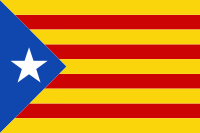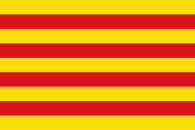Catalonia
Catalonia (Catalan: Catalunya; Occitan: Catalonha; Spanish: Cataluña) is either a country or a "nationality"[1] organized into an autonomous community in Spain, depending on whom you listen to. It includes the major Spanish city of Barcelona, and its namesake football team.[2] An independence referendum was held on October 1, 2017. Out of the 43% of Catalan voters who voted, 90% voted to become their own nation state.[3] However, the election was not supported by every Catalan. The probability is the community is near to being evenly split on the issue.[4]
History[edit]
The Principality of Catalonia as a political entity was built along the middle ages and the early modern period,[5] as a member of the composite monarchy known as the Crown of Aragon (which must not be confused with one of its constituent parts, the Kingdom of Aragon). It dominated large parts of the Mediterranean lands, as well as the trade routes across the sea. Catalonia has been part of the Monarchy of Spain since the crowns of Castile and Aragon joined into a dynastic union, with Catalonia and the other realms retaining their own legislation and institutions. Eventually, calls for separation from Spain flared up, starting as early as the 17th century.[6] Catalonia supported the claim of Charles of Habsburg in the War of the Spanish Succession (1701-1715) and, after its defeat, the Bourbons supressed much of the Catalan institutional system, replacing it with an absolutist government. During the 19th century it became a center of industrialization. The Second Spanish Republic (1931-1939) established the political self-government of Catalonia. During the Spanish Civil War (1936-1939), Catalonia remained loyal to the Republic, because the left-wing nationalists, as well as the anarco-syndicalists had much of the power. It took until 1939 for Barcelona to fall, and Catalonia was one of the last Republican strongholds until the very end of the war. In the Spanish Civil War, George Orwell fought in Catalonia, and later wrote his book, Homage to Catalonia.[7]
Independence referendum[edit]
Catalonia was autonomous in the time before the rule of Francisco Franco, but lost that autonomy under his dictatorial rule. However, after Franco's death (1975), Catalonia regained much of their autonomy. In 2006, Catalonia became even more autonomous, with some additional financial powers not previously had. That state ended in 2010, when the Constitutional Court of Spain decided that part of the Statute of Autonomy was in violation of the Constitution. Many Catalan citizens criticized the decision and then wanted the self-determination and even more or total independence from Spain. Separatists came into power in 2015, and they then planned a full referendum for October 1, 2017, also known as 1-O in the area. Many people who could have voted did not, especially those associated with the unionists, which were boycotting it, and those that opposed independence. The turnout was 43%. 90% of voters voted for Catalonia to be an independent nation.[8] On October 27, independence was declared by the Catalan parliament, though Spain had already readied to take legal action against Catalonia if that occurred. Spain swiftly moved to dissolve the Parliament of Catalonia, get rid of the heads of the government, and call for snap elections. Carles Puigdemont, the then-President of Catalonia, later fled to Brussels, Belgium.
Arguments for independence[edit]

- Catalonia has its own separate culture, distinct from the predominant one of Spain.[9]
- Many Catalans strongly support a republican form of governnment instead of a Monarchy, which they identified with the current Spanish system of government, defending a Catalan Republic as the only way to achieve the change.
- The Catalan language, despite having official status within Catalonia, the Balearic Islands and Valencia, is denied support by Spain in the political, social and economic areas beyond these territories, for example, denying its official use at the European Parliament several times, therefore, Catalan and the other minority language of Catalonia, the Occitan, would be better protected and promoted under the rule of a sovereign Catalan government.
- Catalonia, as an industrial powerhouse, could survive, and even thrive, on its own.
- The Catalan people want independence, as they voted for it. If you didn't vote, then, guess what, your vote doesn't count. That's how a democracy works.
- A considerable amount of Catalonia's GDP goes to help other regions of Spain, in the form of fiscal deficit.
- Unlike the United Kingdom and Scotland, Spain doesn't let the most relevant Catalan national sport teams play at an international level by themselves, and even tried to deny Catalan sports teams to access at international organizations.[10]
Arguments against independence[edit]
- Smaller domestic market is and has always been an economic disadvantage. To think that Catalonia would become an exception (like Switzerland, which has been achieved under very different circumstances) is a big leap of faith.
- Smaller size also means a lower political weight in International institutions.
- International recognition is going to be an issue, with the (today) strong opposition by most major powers (and all of them have veto power in relevant decisions, such as accession to UN or to the EU).
- In regards to the latter point not only Catalonia would at first be outside all international organizations, having to start from zero in that regard, but it would also have to begin from scratch in almost every other sense (minting its own coin, building its own institutions as a central bank, even an army, etc.), things that ain't free even if some as defense could be provided by neighboring countries signing treaties with them.
- Some Catalans complain that Spain has not supported their wish to have Catalan recognized in the European Parliament. If it was recognized, then every minority language in Europe could make the same claim. In Spain alone this would include, at minimum, Aranese, Basque, Valencian and Galacian, and if those languages are recognized, why not also recognize immigrant languages like Berber and Arabic that are spoken by a similar number of people in Spain? Most other European countries would have a similar selection of minority languages. Providing translation services for just the existing 24 official languages needs a staff of some 5,000 translators and costs millions.
- Catalonia's debt would go with it, and at least until international recognition was achieved it would be very hard for the country to obtain funding in the international bond market.
- Catalonia is now part of a economic network in Spain that would be probably disrupted.
- Socially, one could expect some unrest between those who have been vigorously supporting independence and those who have been equally vigorously opposing it.
- Spain will be helped economically by remaining with Catalonia.
- Spain has already said no, so independence is a moot subject.
- If you're into football (soccer for US readers), imagine the FC Barcelona
 outside all international competitions and having to play just with lesser teams of the now country, that are currently outshined by it -for a time at least-. This argument, however, enters in a contratidicion with the fact that Spain doesn't allow to play the Catalan national sport teams outside the State, so we can't be sure about the level of them until they play it.
outside all international competitions and having to play just with lesser teams of the now country, that are currently outshined by it -for a time at least-. This argument, however, enters in a contratidicion with the fact that Spain doesn't allow to play the Catalan national sport teams outside the State, so we can't be sure about the level of them until they play it.
Culture[edit]
The Catalonian culture does share some similarities with that of the rest of Spain, but is different. They share much the same history and they share the same soccer league, La Liga. However, some Catalans have a different national identity than that of other Spaniards. Catalan cuisine, though similar enough to Spanish cuisine that some people could confuse it, is a different cuisine,[11] though to be fair the same could be said for other Spanish regions. Catalan cuisine generally involves fresh seafood, meat, and vegetables that are native to the region. Bread with tomato; botifarra, a sausage; and escudella, a stew, are three common Catalan dishes. Crema Catalana, a dessert similar to crème brulée, is also a hallmark of Catalan cuisine.
Catalan language[edit]
Catalan is one of the languages spoken in Catalonia aside from Spanish. It is also spoken in parts of Valencia, a small segment of France, Andorra![]() , the Balearic Islands, a small part of Aragon, and Alghero in Sardinia. It is the sole official language of Andorra.[12] Valencian is either the Catalan dialect of Valencia, the opinion favoured by most knowledgeable linguists, or a very closely related separate language. Roughly 9.5 million people speak Catalan, most of them in Catalonia. The Renaixença, Catalan for the Renaissance, was the period in which Catalan culture, and especially the language, underwent a status transformation into a respectable language for writers such as Jacint Verdaguer and other intellectuals. Institut d'Estudis Catalans is the primary standardizer of the Catalan language. Catalan is a Romance language and thus descended from Latin. It is related to Spanish, but is by no means mutually intelligible, and it is closer to the Occitan language of southern France. Between Latin and Catalan was the form of the language known as Old Catalan.[13]
, the Balearic Islands, a small part of Aragon, and Alghero in Sardinia. It is the sole official language of Andorra.[12] Valencian is either the Catalan dialect of Valencia, the opinion favoured by most knowledgeable linguists, or a very closely related separate language. Roughly 9.5 million people speak Catalan, most of them in Catalonia. The Renaixença, Catalan for the Renaissance, was the period in which Catalan culture, and especially the language, underwent a status transformation into a respectable language for writers such as Jacint Verdaguer and other intellectuals. Institut d'Estudis Catalans is the primary standardizer of the Catalan language. Catalan is a Romance language and thus descended from Latin. It is related to Spanish, but is by no means mutually intelligible, and it is closer to the Occitan language of southern France. Between Latin and Catalan was the form of the language known as Old Catalan.[13]
See also[edit]
References[edit]
- ↑ "First article of the Statute of Autonomy of Catalonia. 'Catalonia, as a nationality, exercises its self-government constituted as an autonomous community...'". Gencat.cat. Retrieved 30 June 2018.
- ↑ https://www.lonelyplanet.com/spain/barcelona
- ↑ BBC, https://www.bbc.com/news/world-europe-29478415
- ↑ Nov 2019 poll
- ↑ Sesma Muñoz, José Angel. La Corona de Aragón. Una introducción crítica. Zaragoza: Caja de la Inmaculada, 2000 (Colección Mariano de Pano y Ruata - Dir. Guillermo Fatás Cabeza)
- ↑ https://www.britannica.com/place/Catalonia
- ↑ Homage to Catalonia by George Orwell (1938).
- ↑ https://www.independent.co.uk/news/world/europe/catalonia-independence-referendum-final-results-90-spain-madrid-barcelona-catalan-latest-a7987026.html
- ↑ https://www.debatingeurope.eu/focus/independence-catalonia/#.WzTIu-gvy3A
- ↑ See theFresno Case
- ↑ https://www.barcelona-tourist-guide.com/en/restaurants/catalan/catalan-cuisine-guide.html
- ↑ https://www.omniglot.com/writing/catalan.htm
- ↑ Catalan Language, Britannica

